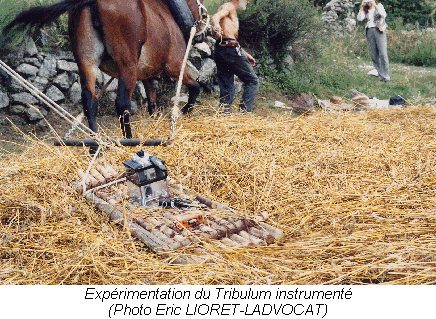This is an excerpt from the book “A Study of Words” by Richard Chevenix Trench, dated 1859. This version is actually drawn from the Sanders “Rhetorical or Union Sixth Reader” from 1862. It focuses on the “poetry” of the term “tribulation.”

Tribulum in Action
A popular American author has somewhere characterized language as “fossil poetry,” [Ralph Waldo Emerson] –evidently meaning that just as is some fossil, curious and beautiful shapes of vegetable or animal life are permanently bound up with the stone, and rescued from that perishing which would otherwise have been theirs– so, in words, are beautiful thoughts and images, –the imagination and feeling of past ages, preserved and made safe forever.
Language, then, is fossil poetry; in other words, we are not to look for the poetry which a people may possess, only in its poems, or its poetical customs, traditions, and beliefs. Many a single word, also, is itself a concentrated poem, having stores of poetical thought and imagery laid up in it. Examine it, and it will be found to rest on some deep analogy of things natural and things spiritual; bringing those to illustrate and to give an abiding form and body to these.
“Iliads without a Homer,” some one has called, with a little exaggeration, the beautiful but anonymous ballad poetry of Spain. One may be permitted, perhaps to push the exaggeration a little further in the same direction, and to apply the phrase not merely to a ballad, but to a word. Let me illustrate that which I have been here saying somewhat more at length by the word “tribulation.”
We all know, in a general way, that this word, which occurs not seldom in Scripture and in the Liturgy, means affliction, sorrow, anguish; but it is quite worth our while to know how it means this, and to question the word a little closer. It is derived from the Latin “tribulum” –which was the thrashing instrument or roller, whereby the Roman husbandman separated the corn from the husks; and “tribulation,” in its primary signicance, was the act of making this separation.
But some Latin writer of the Christian church appropriated the word and image for the setting forth of a higher truth; and sorrow, distress, and adversity, being the appointed means for the separating, in men, of their chaff from their wheat, of whatever, in them was light and trivial and poor from the solid and the true, therefore, he called these sorrows and griefs “tribulations,” thrashings, that is, of the inner spiritual man, without which there could be no fitting him for the Heavenly garner.
Now, in proof of what I have just said, namely, that a single word is often a concentrated poem, a little grain of gold capable of being beaten out into a broad extent of gold-leaf, I will quote, in reference to this very word “tribulation,” a graceful composition by an early English poet, which, you will at once perceive, is all wrapped up in this word:–
Till from the straw, the flail the corn doth beat,
Until the chaff be purged from the wheat-
Yea, till the mill the grain in pieces tear,
The richness of the flour will scarce appear;
So, till men’s persons great afflictions touch,
If worth be found, their worth is not so much;
Because, like wheat in straw, they have not yet
That value which in thrashing they may get.
For, till the bruising flails of God’s corrections
Have threshed out of us our vain affections-
Till those corruptions, which do misbecome us,
Are by Thy Sacred Spirit winnowed from us.
Until from us the straw of worldly treasures-
Till all the dusty chaff of empty pleasures-
Yea, till His flail upon us He doth lay
To thrash the husk of this our flesh away,
And leave the soul uncovered-nay, yet more-
Till God shall make our very spirit poor,
We shall not up to highest wealth aspire,
And then we shall,-and that is my desire.
[George Wither]
